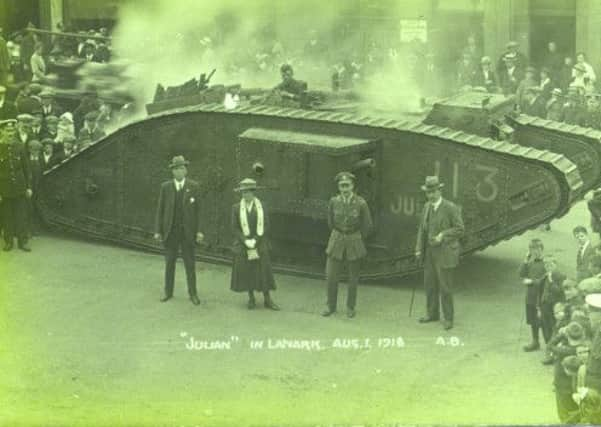Pupils learn about Clydesdale’s wartime history


Just a glance through the editions of the Gazette during these terrible years of 1914 to 18 shows that official censorship was shielding the public from most of the bad news about the conflict.
Funnily enough, with the Government giving out little if any information on any setbacks, the Gazette’s news of the various defeats and disasters came direct from the mouths of the local soldiers who had survived them or via their families who’d gleaned the information through letters home from the Front.
Advertisement
Hide AdAdvertisement
Hide AdEven in the immediate aftermath of the war, youngsters in the classroom were carefully guided towards a conclusion that it had been ‘all worth it.’
Now, a hundred years on, a truer story is finally being told to schoolchildren five generations later thanks to the Clydesdale Heritage Project, now entering its third year of going around our schools with its presentation on that war and on the events that led from it.
So far 35 schools have been visited by the group and it plans to eventually have called at every single primary in the Clydesdale area.
It being about local history, it’ll come as no surprise to readers that Lanark’s Ed Archer is heavily involved in the Group and he is an avid fan of teaching youngsters about their area’s past with real objects and artefacts they can examine and touch.
Advertisement
Hide AdAdvertisement
Hide Ad“It’s the opposite of what I call ‘Death by Powerpoint’ teaching,” he commented.
“Instead, we keep them interested by bringing along actual items used during the war, be they the metal gift boxes sent to the troops at the Front by a Royal princess, the special medal struck to mark the sinking of the Lusitania or even just a newspaper from that era.
“These are all ‘real’ things that makes the events of 100 years ago ‘real’ to them.”
He said an interesting, regular occurrence during their school visits is the keenness of the pupils to hear about World War Two as well, a phenomenon Ed thinks is partly down to the fact that, even today, Hollywood and television is making more dramas about that later global conflict than it is about the first.
Advertisement
Hide AdAdvertisement
Hide Ad“We don’t mind as, as far as I am concerned, World War Two was a consequence of World War One. In fact, we go on further to show how that 1914-18 war was STILL having an impact on the young into the Sixties; when I was a child in that decade, there were still plenty of survivors of that war about to talk to directly about their experiences.
“This current generation of primary children will be the first with absolutely no-one still alive who can give them direct eyewitness accounts about the horrors of that war.
“It is so important, then, that people of my generation, who got that account first-hand from veterans, pass that story on before we too disappear into history.”
He is also keen to promote another Heritage Project which should come to fruition later this year.
Advertisement
Hide AdAdvertisement
Hide AdIt will be a history book about Clydesdale - with a difference.
He explains: “This won’t be a comprehensive history of our area because it would take a small library of books to tell that story in its entireity.”
He says that the Project’s volume will concentrate on facts that have probably gone unrecorded elsewhere.
He adds: “It’ll have lesser-known highlights of our area’s past such as the day that none other than Karl Marx came to visit Monteith House at Carstairs!”